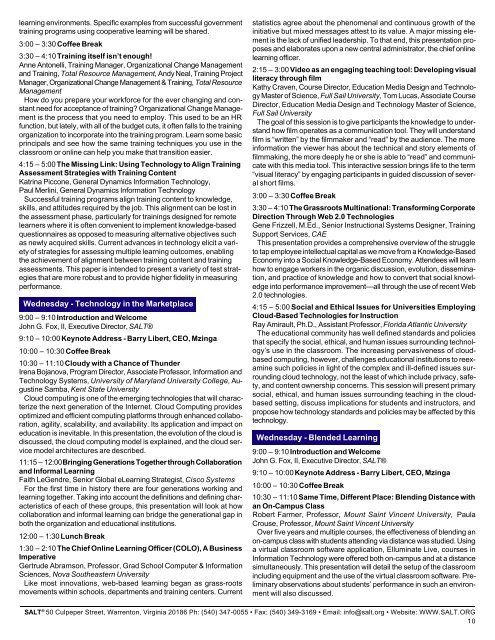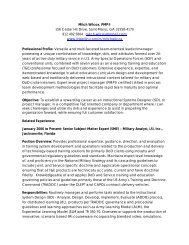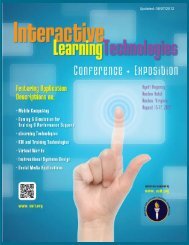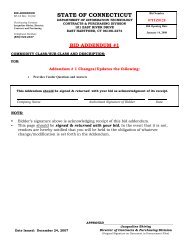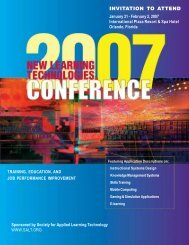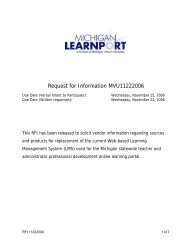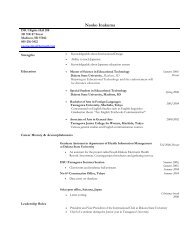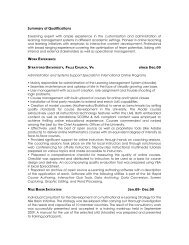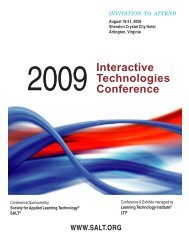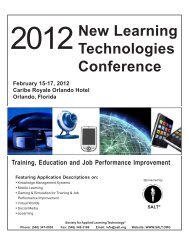K:\Orlando\Orlando 2011\Brochur - SALT
K:\Orlando\Orlando 2011\Brochur - SALT
K:\Orlando\Orlando 2011\Brochur - SALT
Create successful ePaper yourself
Turn your PDF publications into a flip-book with our unique Google optimized e-Paper software.
learning environments. Specific examples from successful government<br />
training programs using cooperative learning will be shared.<br />
3:00 – 3:30 Coffee Break<br />
3:30 – 4:10 Training itself isn’t enough!<br />
Anne Antonelli, Training Manager, Organizational Change Management<br />
and Training, Total Resource Management, Andy Neal, Training Project<br />
Manager, Organizational Change Management & Training, Total Resource<br />
Management<br />
How do you prepare your workforce for the ever changing and constant<br />
need for acceptance of training Organizational Change Management<br />
is the process that you need to employ. This used to be an HR<br />
function, but lately, with all of the budget cuts, it often falls to the training<br />
organization to incorporate into the training program. Learn some basic<br />
principals and see how the same training techniques you use in the<br />
classroom or online can help you make that transition easier.<br />
4:15 – 5:00 The Missing Link: Using Technology to Align Training<br />
Assessment Strategies with Training Content<br />
Katrina Piccone, General Dynamics Information Technology,<br />
Paul Merlini, General Dynamics Information Technology<br />
Successful training programs align training content to knowledge,<br />
skills, and attitudes required by the job. This alignment can be lost in<br />
the assessment phase, particularly for trainings designed for remote<br />
learners where it is often convenient to implement knowledge-based<br />
questionnaires as opposed to measuring alternative objectives such<br />
as newly acquired skills. Current advances in technology elicit a variety<br />
of strategies for assessing multiple learning outcomes, enabling<br />
the achievement of alignment between training content and training<br />
assessments. This paper is intended to present a variety of test strategies<br />
that are more robust and to provide higher fidelity in measuring<br />
performance.<br />
Wednesday - Technology in the Marketplace<br />
9:00 – 9:10 Introduction and Welcome<br />
John G. Fox, II, Executive Director, <strong>SALT</strong>®<br />
9:10 – 10:00 Keynote Address - Barry Libert, CEO, Mzinga<br />
10:00 – 10:30 Coffee Break<br />
10:30 – 11:10 Cloudy with a Chance of Thunder<br />
Irena Bojanova, Program Director, Associate Professor, Information and<br />
Technology Systems, University of Maryland University College, Augustine<br />
Samba, Kent State University<br />
Cloud computing is one of the emerging technologies that will characterize<br />
the next generation of the Internet. Cloud Computing provides<br />
optimized and efficient computing platforms through enhanced collaboration,<br />
agility, scalability, and availability. Its application and impact on<br />
education is inevitable. In this presentation, the evolution of the cloud is<br />
discussed, the cloud computing model is explained, and the cloud service<br />
model architectures are described.<br />
11:15 – 12:00 Bringing Generations Together through Collaboration<br />
and Informal Learning<br />
Faith LeGendre, Senior Global eLearning Strategist, Cisco Systems<br />
For the first time in history there are four generations working and<br />
learning together. Taking into account the definitions and defining characteristics<br />
of each of these groups, this presentation will look at how<br />
collaboration and informal learning can bridge the generational gap in<br />
both the organization and educational institutions.<br />
12:00 – 1:30 Lunch Break<br />
1:30 – 2:10 The Chief Online Learning Officer (COLO), A Business<br />
Imperative<br />
Gertrude Abramson, Professor, Grad School Computer & Information<br />
Sciences, Nova Southeastern University<br />
Like most innovations, web-based learning began as grass-roots<br />
movements within schools, departments and training centers. Current<br />
statistics agree about the phenomenal and continuous growth of the<br />
initiative but mixed messages attest to its value. A major missing element<br />
is the lack of unified leadership. To that end, this presentation proposes<br />
and elaborates upon a new central administrator, the chief online<br />
learning officer.<br />
2:15 – 3:00 Video as an engaging teaching tool: Developing visual<br />
literacy through film<br />
Kathy Craven, Course Director, Education Media Design and Technology<br />
Master of Science, Full Sail University, Tom Lucas, Associate Course<br />
Director, Education Media Design and Technology Master of Science,<br />
Full Sail University<br />
The goal of this session is to give participants the knowledge to understand<br />
how film operates as a communication tool. They will understand<br />
film is “written” by the filmmaker and “read” by the audience. The more<br />
information the viewer has about the technical and story elements of<br />
filmmaking, the more deeply he or she is able to “read” and communicate<br />
with this media tool. This interactive session brings life to the term<br />
“visual literacy” by engaging participants in guided discussion of several<br />
short films.<br />
3:00 – 3:30 Coffee Break<br />
3:30 – 4:10 The Grassroots Multinational: Transforming Corporate<br />
Direction Through Web 2.0 Technologies<br />
Gene Frizzell, M.Ed., Senior Instructional Systems Designer, Training<br />
Support Services, CAE<br />
This presentation provides a comprehensive overview of the struggle<br />
to tap employee intellectual capital as we move from a Knowledge-Based<br />
Economy into a Social Knowledge-Based Economy. Attendees will learn<br />
how to engage workers in the organic discussion, evolution, dissemination,<br />
and practice of knowledge and how to convert that social knowledge<br />
into performance improvement—all through the use of recent Web<br />
2.0 technologies.<br />
4:15 – 5:00 Social and Ethical Issues for Universities Employing<br />
Cloud-Based Technologies for Instruction<br />
Ray Amirault, Ph.D., Assistant Professor, Florida Atlantic University<br />
The educational community has well defined standards and policies<br />
that specify the social, ethical, and human issues surrounding technology’s<br />
use in the classroom. The increasing pervasiveness of cloudbased<br />
computing, however, challenges educational institutions to reexamine<br />
such policies in light of the complex and ill-defined issues surrounding<br />
cloud technology, not the least of which include privacy, safety,<br />
and content ownership concerns. This session will present primary<br />
social, ethical, and human issues surrounding teaching in the cloudbased<br />
setting, discuss implications for students and instructors, and<br />
propose how technology standards and policies may be affected by this<br />
technology.<br />
Wednesday - Blended Learning<br />
9:00 – 9:10 Introduction and Welcome<br />
John G. Fox, II, Executive Director, <strong>SALT</strong>®<br />
9:10 – 10:00 Keynote Address - Barry Libert, CEO, Mzinga<br />
10:00 – 10:30 Coffee Break<br />
10:30 – 11:10 Same Time, Different Place: Blending Distance with<br />
an On-Campus Class<br />
Robert Farmer, Professor, Mount Saint Vincent University, Paula<br />
Crouse, Professor, Mount Saint Vincent University<br />
Over five years and multiple courses, the effectiveness of blending an<br />
on-campus class with students attending via distance was studied. Using<br />
a virtual classroom software application, Elluminate Live, courses in<br />
Information Technology were offered both on-campus and at a distance<br />
simultaneously. This presentation will detail the setup of the classroom<br />
including equipment and the use of the virtual classroom software. Preliminary<br />
observations about students’ performance in such an environment<br />
will also discussed.<br />
<strong>SALT</strong> ® 50 Culpeper Street, Warrenton, Virginia 20186 Ph: (540) 347-0055 • Fax: (540) 349-3169 • Email: info@salt.org • Website: WWW.<strong>SALT</strong>.ORG<br />
10


